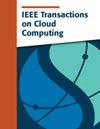RAM: A Resource-Aware DDoS Attack Mitigation Framework in Clouds
IF 5
2区 计算机科学
Q1 COMPUTER SCIENCE, INFORMATION SYSTEMS
引用次数: 0
Abstract
Distributed Denial of Service (DDoS) attacks threaten cloud servers by flooding redundant requests, leading to system resource exhaustion and legitimate service shutdown. Existing DDoS attack mitigation mechanisms mainly rely on resource expansion, which may result in unexpected resource over-provisioning and accordingly increase cloud system costs. To effectively mitigate DDoS attacks without consuming extra resources, the main challenges lie in the compromisesbetween incoming requests and available cloud resources. This paper proposes a resource-aware DDoS attack mitigation framework named RAM, where the mechanism of feedback in control theory is employed to adaptively adjust the interaction between incoming requests and available cloud resources. Specifically, two indicators including request confidence level and maximum cloud workload are designed. In terms of these two indicators, the incoming requests will be classified using proportional-integral-derivative (PID) feedback control-based classification scheme with request determination adaptation. The incoming requests can be subsequently processed according to their confidence levels as well as the workload and available resources of cloud servers, which achieves an effective resource-aware mitigation of DDoS attacks. Extensive experiments have been conducted to verify the effectiveness of RAM, which demonstrate that the proposed RAM can improve the request classification performance and guarantee the quality of service.RAM:云中的资源感知型DDoS攻击缓解框架
分布式拒绝服务(DDoS)攻击通过大量的冗余请求威胁云服务器,导致系统资源耗尽和合法服务关闭。现有的DDoS攻击缓解机制主要依赖于资源扩展,这可能会导致意想不到的资源过剩,从而增加云系统成本。为了在不消耗额外资源的情况下有效地缓解DDoS攻击,主要挑战在于传入请求和可用云资源之间的折衷。本文提出了一种资源感知的DDoS攻击缓解框架RAM,该框架利用控制论中的反馈机制自适应调整传入请求与可用云资源之间的交互。具体而言,设计了请求置信度和最大云工作负载两个指标。根据这两个指标,将使用基于比例-积分-导数(PID)反馈控制的分类方案对传入请求进行分类,并具有请求确定适应性。随后可以根据其置信度以及云服务器的工作负载和可用资源处理传入请求,从而实现对资源敏感的DDoS攻击的有效缓解。大量的实验验证了RAM的有效性,结果表明所提出的RAM可以提高请求分类性能,保证服务质量。
本文章由计算机程序翻译,如有差异,请以英文原文为准。
求助全文
约1分钟内获得全文
求助全文
来源期刊

IEEE Transactions on Cloud Computing
Computer Science-Software
CiteScore
9.40
自引率
6.20%
发文量
167
期刊介绍:
The IEEE Transactions on Cloud Computing (TCC) is dedicated to the multidisciplinary field of cloud computing. It is committed to the publication of articles that present innovative research ideas, application results, and case studies in cloud computing, focusing on key technical issues related to theory, algorithms, systems, applications, and performance.
 求助内容:
求助内容: 应助结果提醒方式:
应助结果提醒方式:


